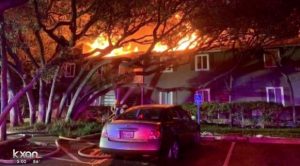
Austin Apartment Fire Leaves Two People Dead. (KXAN.com)
Could the deaths from this apartment fire have been prevented and are justice and compensation available to the victims families? Read Our Legal Take below to find out what legal options are available.
Local News
A fire engulfed an Austin, Texas apartment building early Monday morning, July 15, 2019, leaving two people dead and multiple residents displaced. According to Statesman.com, “[f]irefighters responded to the Woods on Barton Skyway, in the 2900 block of Barton Skyway, around 4:30 a.m.” The firefighters had the blaze under control within 30 minutes and began to search through eight apartments that were damaged. According to the report, “[o]fficials first reported that no one was injured, but during a second search of the complex, firefighters looked through areas that had collapsed in the fire and found the bodies of two people…[t]hey were found in the apartment where the fire began.” According to KXAN.com, “Since 2011, two other major fires have been reported at the complex.” Per the report, the complex was built before sprinklers were a city code requirement.
The fire remains under investigation.
Our Legal Take
As the fire department continues its investigation, premises liability attorneys with The Murray Law Firm question whether a lack of fire safety measures at the complex may have contributed to this incident.
- What fire safety measures, such as working smoke detectors, fire sprinklers and emergency exits, were in place and working at the time of the fire?
- When was the last fire inspection performed on the property?
- Were any safety measures added after any previous fires?
As details of this fire continue to emerge, The Murray Law Firm suggests that it is possible that the apartment complex failed to undertake proper safety measures to protect those residents and guests legally on the premises. Under certain State law, the owner and management company of an apartment complex have a duty to protect residents and to keep the premises safe. If the owner or manager fails in this duty, they may be held civilly liable for any injuries or wrongful deaths that occur as a consequence. Should the apartment complex be found at fault, the families of the victims may elect to hold the owner and management company civilly liable for their loss. Financial recovery for such a claim could be substantial.
It is crucial that the victims and the families of those who perished retain an experienced premises liability firm as soon as possible to ensure all evidence, such as a faulty fire alarm or a poor evacuation plan, is preserved and their interests are protected. The Murray Law Firm has extensive experience in premises liability and apartment negligence cases, such as this, and we offer our legal expertise, if needed.
If anyone has information to share, or if anyone is seeking information regarding this incident, please contact us at 888.842.1616.
Our Results
The Murray Law Firm has obtained over $100 million dollars for its Clients, and recently secured a $29.25 million dollar verdict for a victim of an unsafe property fire.
We represent our Clients on a contingency agreement, which generally means that no fees or payments are owed until and unless we recover. Anyone seeking further information or legal representation is encouraged to contact us via e-mail (click here) or by telephone at CALL NOW: 888.842.1616. Consultations are free and confidential.
Choosing the Right Attorney (CLICK HERE)
 The Legal Herald
The Legal Herald


